Johns Hopkins UniversityEst. 1876
America’s First Research University
Johns Hopkins University was inducted as an institutional member of the Edward Alexander Bouchet Graduate Honor Society in April 2018. Named for the first African American in the United States to receive a PhD, the Edward A. Bouchet Graduate Honor Society seeks to develop a network of pre-eminent scholars who exemplify academic and personal excellence, foster environments of support, and serve as examples of scholarship, leadership, character, service, and advocacy for students and trainees in the academy. It was co-founded in 2005 by Yale University—where Bouchet, a physicist and educator, earned his doctorate in 1876—and Howard University to recognize and continue Bouchet’s pioneering contributions to doctoral education.
PhD Students: All PhD students who will advance to Candidacy, or are All But Dissertation (ABD) by January 1, 2025 are eligible to nominate themselves for consideration as inductees. Candidacy, or All But Dissertation, means that the student has finished all required coursework and passed all required qualifying and preliminary exams, and is working on the dissertation research itself.
Postdoctoral Fellows: Postdoctoral research fellows who have a PhD degree and who are JHU postdocs or whose JHU postdoctoral appointment will start no later than January 1, 2025 are eligible to apply. Residents and subspecialty clinical fellows in Accreditation Council for Graduate Medical Education (“ACGME”)-accredited or ACGME-equivalent programs are not eligible.
These self-nominations included the following:
Inductees are expected to attend the JHU Induction Ceremony (Baltimore) and the Annual Bouchet Conference (New Haven).
If you have questions, please contact: [email protected]
Sumayya Beekun
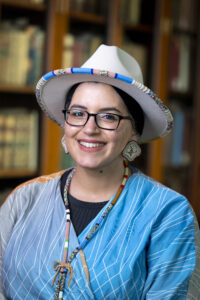
International Health
Beekun is a PhD candidate in the Global Disease Epidemiology and Control program in the International Health Department and Center for Indigenous Health at the Bloomberg School of Public Health. Her research focuses on bacterial infections, community-based and engaged participatory research using Indigenous perspectives and models, mixed and multi-methods, and collaborating and co-creating knowledge with Indigenous and other historically underrepresented communities. Prior to her PhD, Beckon worked at the Centers for Disease Control. During the COVID-19 pandemic, she was deployed to a quarantine station, multiple Emergency Operations Center taskforces, and local health departments. Beekun has since been recognized by the CDC for her “unwavering dedication and service.” She remains devoted to the health of “Mitakuye Oyasin,” a Lakota phrase meaning “all my relations.”
Travis Brady
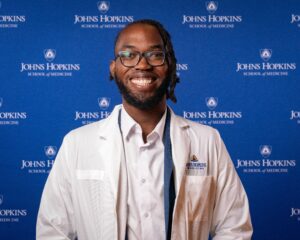
Biomedical Engineering
Brady is a PhD candidate in Biomedical Engineering. His research, which he conducts under professors Lakshmi Santhanam and Sharon Gerecht, focuses on the vascular aging process, integrating in vivo, ex vivo, and in vitro models to map the timeline of age-related vascular stiffening. Brady is particularly interested in extracellular matrix mechanics and its role in cardiovascular health and disease. He previously taught high school engineering courses at Success Academies, inspiring students from diverse backgrounds to explore STEM careers. He now continues this commitment at Johns Hopkins through leadership roles in the Black Graduate Student Association and the BME PhD Application Assistance Program. In addition to receiving multiple fellowships—including the APS Porter Physiology Development Fellowship and the NASEM Ford Foundation Pre-Doctoral Fellowship—Brady’s work has been recognized with best poster awards at local and international conferences. In the future, he hopes to lead a lab that investigates cardiovascular biomechanics, with a particular emphasis on training the next generation of scientists.
Brenice Duroseau

Nursing
Duroseau, a clinician with specializations in infectious diseases and addiction medicine, is an emerging nurse scientist in implementation science focusing on multi-level interventions to eradicate sexual and reproductive health (SRH) disparities. She is currently a PhD candidate at the School of Nursing and an Implementation Science and Social Determinants of Health Fellow at the Bloomberg School of Public Health. Her research explores how social, structural, and political determinants shape SRH experiences, engagement, and access for marginalized women across the lifespan. As a community-driven researcher and policy advocate, Buroseau is committed to dismantling systemic barriers in healthcare and reimagining SRH services to be equitable, affirming, and holistic. She has received several prestigious awards and scholarships, including the 40 Under 40 Public Health Catalyst Award from the Boston Congress of Public Health, the Cecelia Lou Vriheas Scholarship from the NLN Foundation for Nursing Education, and the M. Elizabeth Carnegie Doctoral Degree Scholarship from the Nurses Educational Funds.
Thomas Hinneh
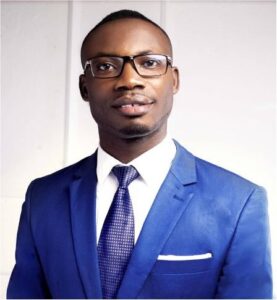
Nursing
Hinneh is a PhD candidate and an American Heart Association predoctoral fellow at the School of Nursing. His research focuses on cardiovascular health equity, team-based care, and community-based cardiovascular health initiatives. His research in Africa focuses on implementing a team-based approach to cardiovascular disease risk management in primary healthcare settings, while his American Heart Association predoctoral fellowship examines how social determinants of health influence cardiovascular disease outcomes among underserved populations in the U.S. His contributions to cardiovascular disease management include establishing a nurse-led cardiovascular disease clinic in primary healthcare facilities in Ghana. He is the executive director and co-founder of HI-Foundation Ghana, a nongovernmental organization dedicated to community-based cardiovascular disease screening in Ghana. In 2020, Thomas received a Euro Project Grant from Pharmacists Without Borders, Germany, to build the capacity of healthcare professionals in four district hospitals in Ghana. His long-term vision is to bridge critical gaps in cardiovascular care through evidence-based and scalable interventions that improve cardiovascular health outcomes in resource-limited settings globally.
Kayla Seymone Ingram
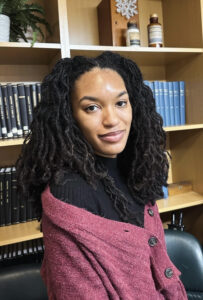
Postdoctoral Research Fellow | Biochemistry and Molecular Biology
Ingram is a postdoctoral fellow in the Department of Biochemistry and Molecular Biology (BMB) at the Bloomberg School of Public Health. Her current research focuses on examining how social determinants of health influence molecular pathways that exacerbate disparities in breast cancer outcomes. Kayla completed her PhD in the Biochemistry, Cellular and Molecular Biology Program at the Johns Hopkins School of Medicine. As a doctoral candidate, Kayla served as Chair of Academic Events and Chair of Public Affairs for the Biomedical Scholars Association. Kayla is currently supported in BMB through the Kirschstein NRSA Postdoctoral Fellow Award. During her postdoctoral studies, Kayla helps facilitate STEM educational initiatives for local high school students in Baltimore, Maryland. She earned her teaching certification through the Collaborative Teaching Fellowship Program, as an adjunct professor at Coppin State University. Kayla ultimately hopes to pursue a career as a teaching scientist dedicated to developing alternative education initiatives for underrepresented students in higher education.
Laura Mata López
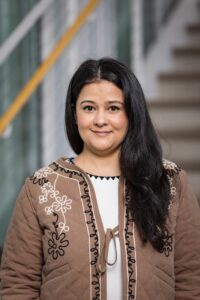
Nursing
López is a PhD candidate at the School of Nursing and a psychiatric nurse practitioner who has dedicated her practice to providing accessible, culturally concordant mental health and substance use services to Latin American immigrants in under-resourced communities and settings. Her original research leverages mixed methods and community-based participatory approaches to generate a nuanced understanding of the lived experiences of Latina immigrants with migration-related trauma and suicide survivorship and to identify key social, cultural, and structural determinants of mental health and suicide in this community. López is passionate about empowering individuals from historically underrepresented backgrounds to participate in research, academic, and policy spaces. She is deeply committed to centering the voices of Latine immigrants through her body of work—recognizing that amplifying community voices is essential to dismantling systemic inequities and driving sustainable change. Her contributions to leadership, advocacy, and service have been recognized through numerous honors—including the 2023 Excellence in Health Equity Research Award from JHSON, the 2023 Johnson & Johnson/Nurses’ Education Fund Health Equity Scholarship, and the 2023 Abbott/National Hispanic Nurses Association Scholarship.
Faith Elise Metlock

Nursing
Metlock is a PhD candidate at the School of Nursing with a certificate in Health Disparities and Health Inequality from the Bloomberg School of Public Health. Her research examines the intersection of social determinants of health, psychological health, and cardiovascular disease prevention and self-management in underserved communities. Through community-engaged approaches, she develops culturally informed interventions to address cardiovascular health disparities. At the School of Nursing, she has served as President of the Black Student Nurses Association and an executive member of the PhD Student Organization. Beyond academia, Faith is the Founder and CEO of Black Health Explained, a health marketing agency dedicated to engaging underrepresented communities in health initiatives. She also leads the Black Health Explained Foundation as its founder and president, focusing on health literacy and diversifying the healthcare workforce through mentorship and education.
Eleana Parajón
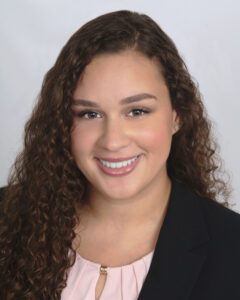
Cellular and Molecular Medicine
Parajón is a PhD candidate in Cellular and Molecular Medicine at the School of Medicine. Her dissertation research explores the role of cytoskeletal proteins — specifically alpha-actinin 4 and non-muscle myosin IIC— that accumulate in response to mechanical stress in pancreatic cancer. Her work aims to unravel how these proteins influence cell growth, morphology, motility, and invasiveness. A passionate advocate for mentorship, Parajón dedicates her time to guiding PhD rotation students, undergraduates, and Baltimore high school students. Among multiple initiatives, she has served as a mentor for the Careers in Science and Medicine Summer Internship Program and the MERIT program. Her commitment to service extends to hospice volunteering, where she provides comfort and support to terminally ill patients and their families. After completing her PhD, Parajón aspires to attend medical school and pursue a career as a physician-scientist, where she aims to leverage her cancer cell biology training to develop innovative treatments that directly benefit patients.
Ladaisha T. Thompson
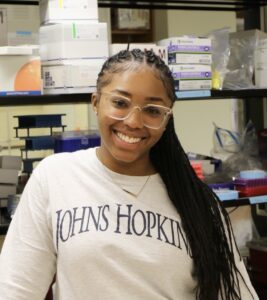
Biomedical Engineering
Thompson is a PhD candidate in Biomedical Engineering whose research focuses on immune aging and leveraging cell motility to predict age and frailty. While at Hopkins, Thompson has been recognized as a Vivien Thomas Scholars Initiative Fellow and an Institute for Basic Biomedical Science Directors Fellow. In 2024, she received the Diversity Ambassador Award for organizing the Hidden Curriculum symposium, an initiative that provides first-year graduate students with essential tools and resources to navigate academia. Passionate about service, mentorship, and community-building, Thompson has dedicated herself to supporting diverse students in STEM. She also has served as co-president of the Biomedical Scholars Association. She has been actively involved in community outreach efforts throughout Baltimore City, including the Baltimore Roller Coaster Contest, Baltimore Community Food Initiatives, and Science in Action, a program that brings hands-on science experiments to Baltimore City elementary students. Beyond her PhD, Ladaisha is committed to increasing access to science education, particularly for students from communities like her own. She aspires to take on a mentorship role as a dean at a research institution, where she can continue fostering inclusivity and supporting the next generation of scientists.
Alejandra Trujillo
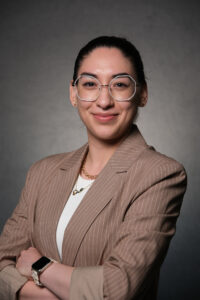
Pathobiology
Trujillo is a PhD candidate in Pathobiology at the School of Medicine, where she specializes in cancer biology, genetics, and pathology. Her research redefines early detection strategies by identifying KRAS mutations in normal pancreatic tissue before precancerous lesions develop, providing critical insights into the earliest stages of pancreatic cancer and paving the way for earlier and more targeted interventions. Beyond her research, Alejandra is a Passport to Future Technology Leadership fellow and a dedicated advocate for diversity in the biomedical sciences. She founded the PATH Scholars Initiative to expand opportunities for students in STEM and has led initiatives to strengthen mentorship, recruitment, and professional development. Through her leadership, she fosters an inclusive academic environment that empowers the next generation of scientists. Trujillo’s dedication to volunteer roles, such as providing academic mentorship to high school students and engaging with diverse communities, demonstrates her commitment to equity, perseverance, and the betterment of others. Additionally, in her service trip to the Dominican Republic and Haiti, Alejandra translated and coordinated care for over 150 patients, helping to bridge language barriers and improve healthcare access.
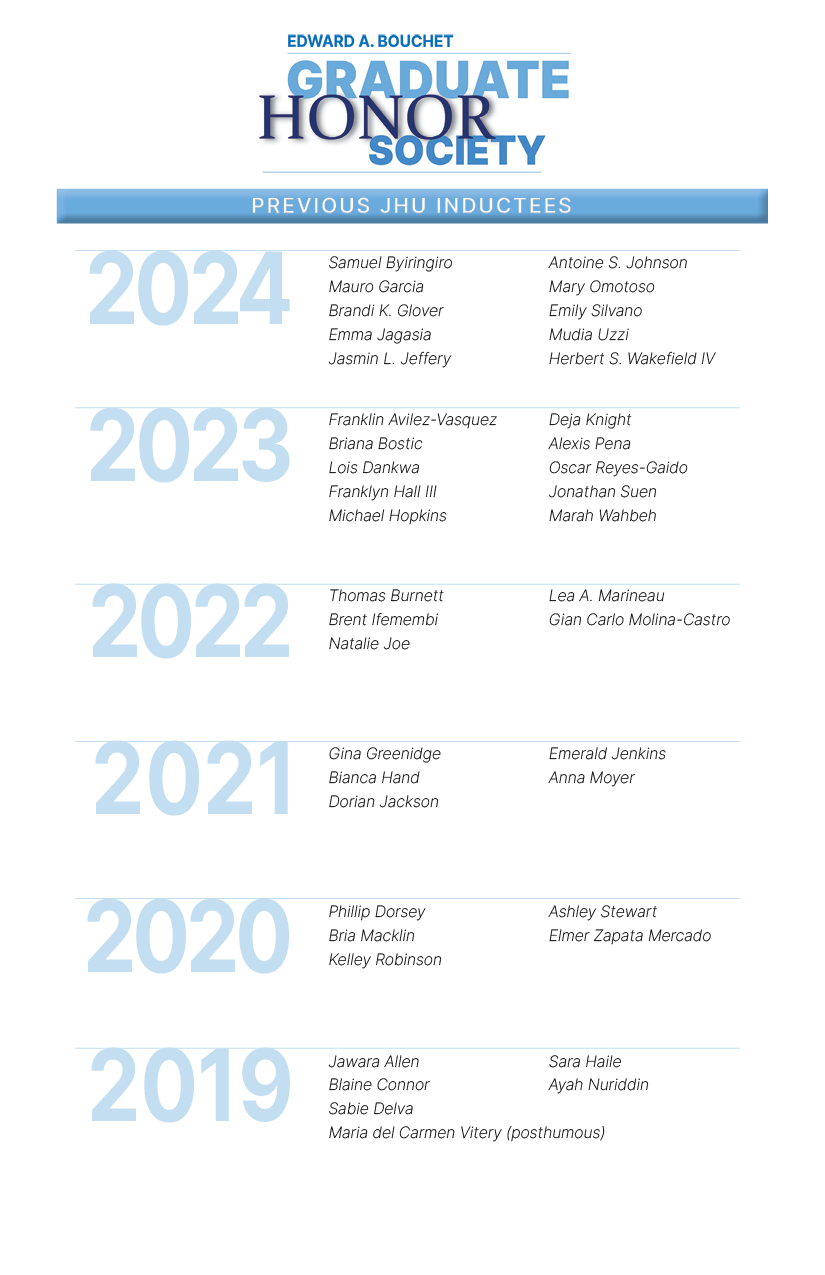
Office of the Provost
265 Garland Hall
3400 North Charles Street
Baltimore, Maryland 21218
Phone: (410) 516-8070
Fax: (410) 516-8035
[email protected]
